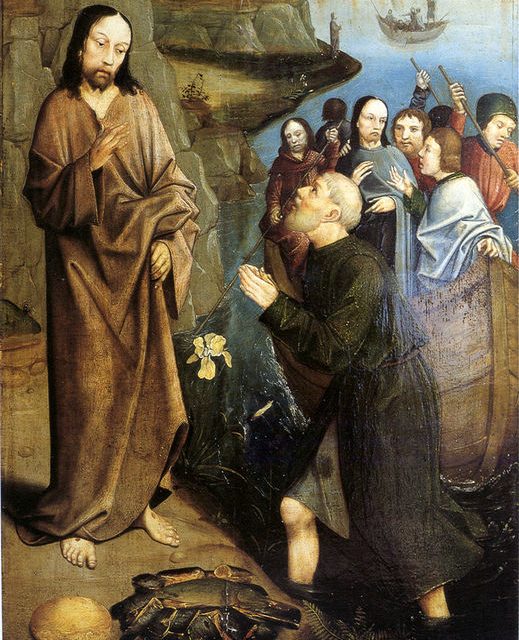Acts 5:27-32, 40b-41
Ps 30:2, 4, 5-6, 11-12, 13
Rev 5:11-14
Jn 21:1-14//Jn 21:1-19
The weeks immediately following Easter take us on quite the liturgical journey, especially in Year C, where we continue forward with the Johannine accounts of the Risen Christ. The first of the readings for this week push us forward in time: from the early resistance to the Church in Acts of the Apostles, to Revelation’s discussion of last things in human history. In the Gospel, the very final chapter of John reveals to us a Jesus who prepares the world, prepares the Church, for life after him: a life of risk, a life lived in the in-between time when we know the Resurrection, but await Jesus’s return and the final consummation of creation.
This week’s Gospel is the third and final time the disciples experience Jesus’s self-revelation after the Resurrection: first, in the private scene with Mary Magdalene, then behind locked doors to a group of fearful, doubting disciples, and now on the shores of a lake while the disciples are fishing. I am fascinated by the trajectory John offers in these appearances. The story shows the disciples slowly moving from the trauma of the cross and tomb to a restoration of something like normal – even if the post-resurrection world is forever changed, there are still fish to catch and meals to cook. The disciples move from confusion, to fear, to out and about doing their work and keeping on top of daily needs.
This final appearance is particularly interesting in how mundane it is. While there is one miracle in the large catch the disciples get after a night of nothing, most of the scene is restrained. There are no questions that demand answers (the disciples know without asking that this is Jesus), no dramatic appearances despite locked doors, no angels and stones rolled away. Peter does, somewhat impulsively, dive in the water and swim to Jesus, but he does not walk on water (as in Mt 14:22-33). For the most part, this is just Jesus and his friends, cooking a meal and sharing in their company.
The images and metaphors that we use for the Church today abound in this story. The disciples – soon-to-be “fishers of men” as Luke calls them in his parallel, but pre-crucifixion story (Lk 5:1-11) – bring in an extraordinary number of fish in an untorn net, but only by following the word of Jesus. Jesus is known in the context of a meal, not only of fish but of bread (Eucharist). And in the long version of the Gospel, Peter is reconciled with Jesus after his denials. These provide for us a denouement to the story, wrapping up loose ends. But they also provide instructions, guidance. Jesus offers a series of commands encoded within this scene: “cast the net,” “bring some of the fish,” “come, have breakfast,” “feed my lambs,” “tend my sheep,” “feed my sheep,” and finally, “follow me.” Subtly, in each imperative statement, we are taught how to grow the Church. We draw in the fish, we share the Eucharistic meal with them, we sustain them, minister to them, all in the name of Jesus.
That this guidance is couched in the dressings of ordinary life, ordinary actions is important. Life will not always be ordinary for the disciples – the first reading from Acts makes that clear. They will suffer, many will die. But nonetheless much of Christian life is very ordinary, is quiet and unassuming. It is found in excitement to see one another, in shared gifts, in reconciliation with a friend you’ve hurt. It is these ordinary actions that sustain the disciples in their later extraordinary work throughout the book of Acts. It is these relationships that will support one another, whether standing before the Sanhedrin or even arguing among themselves about the status of Jews and Gentiles in their burgeoning community.
For my part, as I face the end of a school year and the frenetic pace of final papers, exams, grades, I find comfort in this last appearance of Jesus. There is much work ahead for us as disciples and as the Church, but it is important to be present in this moment, this ordinary moment, now. Jesus is here with us, and will see us off onto the road ahead.



